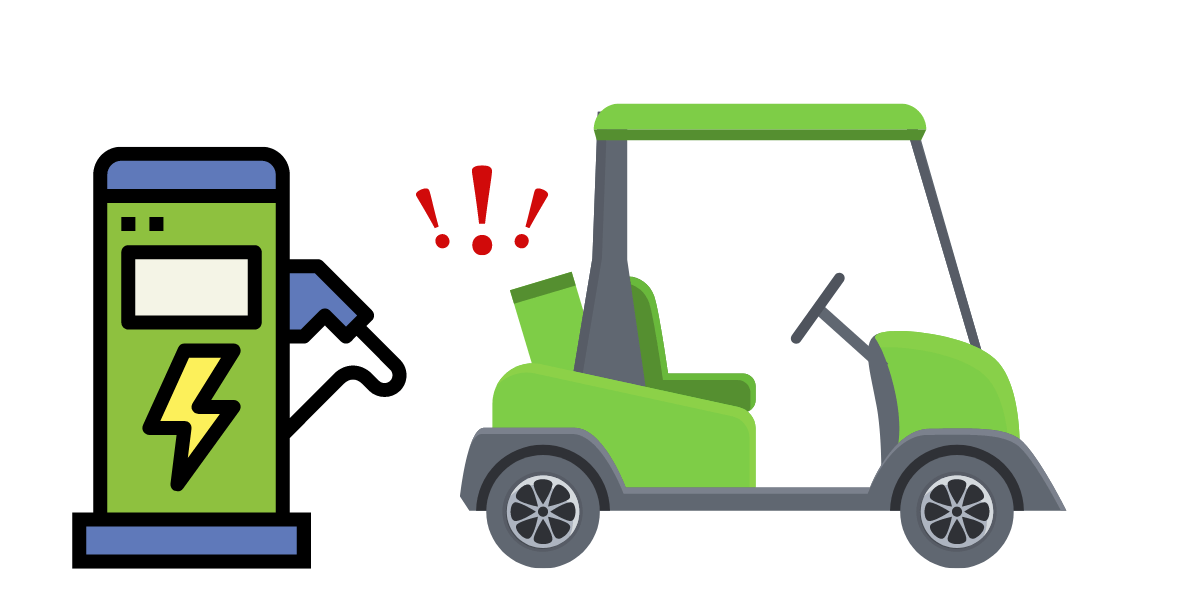Golf carts are the trusty companions of golf enthusiasts, offering convenience and speed on the course. However, as with machinery, they have quirks and occasional issues. One common problem that golf cart owners encounter is the noise of charging their batteries. In this article, we will explore why golf cart batteries make noise when charging and provide you with valuable insights and solutions to keep your golf cart battery charging process smooth and quiet.
Why do Golf Cart Batteries make Noise when charging?

When you observe a bubbling or gurgling sound while charging your golf cart batteries, this may be the reason:
Battery Chemistry and Reactions
When you plug in your golf cart battery for charging, chemical reactions occur inside it. These reactions involve the movement of electrons and converting chemical energy into electrical energy. Sometimes, these reactions can produce a buzzing or humming sound. The noise is typically a result of the chemical processes at work, indicating that your battery is undergoing the necessary transformations to recharge.
Electrolyte Movement and Gassing
Another factor contributing to the noise during charging is the movement of electrolytes within the battery. As the charging process progresses, the electrolyte, a mixture of water and sulfuric acid, circulates and interacts with the battery’s lead plates. This movement can create gurgling or bubbling sounds. The charging process may also cause the electrolyte to release glasses, generating further noise.
Overcharging and Voltage Irregularities
If your golf cart battery is overcharged or experiencing voltage irregularities, it can lead to excessive noise during charging. Overcharging occurs when the battery receives more voltage than it can handle. This can cause the electrolyte to boil and release gasses more vigorously, resulting in loud noises. Voltage irregularities, such as fluctuations or inconsistent charging levels, can also contribute to noise.
Faulty Battery Components
Noisy charging can also be an indicator of faulty battery components. Damaged plates, loose connections, or degraded terminals can impede the proper flow of electrical energy and generate unusual sounds during the charging process. Regular inspections and maintenance are essential for identifying and rectifying these issues.
Effects of Noise during Charging
Noise during charging can have the following effects:
Disruption to the Charging Process: Excessive noise during charging may indicate an underlying problem that could disrupt the charging process. Attention to these noises is crucial as they could signal inefficient charging, potentially leading to an incomplete recharge or reduced battery capacity.
Potential Damage to Battery and Charger: Continued noise during charging can harm the battery and the charger. The excessive vibrations and heat generated by the noise can accelerate wear and tear on battery components, reducing their lifespan. Additionally, it can strain the charger, potentially leading to its malfunction or decreased performance.
Safety Concerns for Users: If your golf cart batteries make noise when charging, this may pose safety concerns. It might indicate a more significant issue with the electrical system if ignored. In rare cases, it could lead to potential electrical hazards, making it crucial to address any unusual noise promptly.
Golf Cart Batteries Make Noise when Charging: Troubleshooting and Solutions

Now that you know what causes the noise and its effects, it’s time to troubleshoot this problem. Here is what you can do:
Identifying the Source of the Noise
Begin troubleshooting by identifying the specific source of the noise. Listen closely to isolate whether the noise comes from the battery or surrounding electrical connections. This will help determine the appropriate course of action.
Addressing Battery Chemistry Issues
Maintaining the battery’s chemistry is vital for noise reduction. Ensure the electrolyte levels are within the manufacturer’s recommended range. The golf cart batteries smell after I long time not used. If the levels are low, carefully add distilled water to bring them up. Be cautious not to overfill, leading to electrolyte leakage and additional noise.
Checking and Adjusting Charging Parameters
Monitor the charging parameters regularly and adjust them according to the manufacturer’s instructions. This includes ensuring the charger compatible with your battery’s voltage and using the correct charging mode. Avoid overcharging by setting appropriate charging durations and voltage limits.
Maintaining and Replacing Faulty Components
Regularly inspect your battery for any signs of damage or deterioration. Check for loose connections, corroded terminals, or damaged plates. If you notice any issues, promptly tighten connections, clean terminals, or replace damaged components. Remember, proactive maintenance can prevent noise-related problems down the line.
Preventive Measures and Maintenance

- Regularly inspect and clean the battery terminals without baking soda to prevent corrosion. Examine the battery routinely for signs of wear and take action if any issues arise.
- Charge your battery properly to minimize noise and ensure optimal performance. Avoid using a charger that is not compatible with your battery or one that is damaged. Always use a charger that matches the specifications of your battery. Always refer to the manufacturer’s instructions for the recommended charging procedures.
- Periodically monitor the individual cells of your battery. Use a hydrometer or a battery monitor to check each cell’s specific gravity and voltage levels. Balancing the cells by equalizing their charge levels helps maintain a quieter and more efficient charging process.
- If your battery continues to produce excessive noise even after troubleshooting and maintenance efforts, it may be time to consider replacing it. Consult with a professional or seek guidance from your battery manufacturer to select a suitable replacement that meets your golf cart’s requirements.
Exploring the Types of Golf Cart Battery Noise and What They Indicate?

Each time golf cart batteries make a noise when charging, this indicates that either the charger or battery is malfunctioning. Here are the most common golf cart battery noises and their meanings.
The sizzling or hissing sound
During charging, golf cart batteries often produce a hissing or sizzling sound due to hydrogen gas released from the electrolyte solution. However, if the sizzling sound is unusually loud, it could indicate an overcharging issue, low water, or low acid in the battery, which could be dangerous and require immediate attention. However, excessive noise happens when charging cells face different temperatures during charging.
Bubbling or boiling sound
Bubbling or boiling sounds can be pretty normal in the charging process, especially when you have a new battery. The electrolyte solution inside the battery heats up, or water boils (overcharging). But if you notice unnecessary heating due to overcharging, you should worry about it and unplug the charger from the battery.
Clicking Sound
When you notice a clicking sound, it may or may not indicate an alarming sign. However, it’s important to address the location where the sound is coming from. The sound can be coming from either a charger or a battery. And there can be several factors of the charger and battery clicking issues. But this can happen due to loose or corroded connections.
FAQs
If golf cart batteries make noise when charging, is it bad?
Golf cart batteries make noise when charging, such as vibration or another while in operation. However, if you notice a sound that is louder or different than usual, it can be an alarming sign that there’s some issue you need to control.
For instance, if you hear a popping sound, it’s because of leaking in the battery or overcharging issues. And if you hear a sound like clicking, it may be because of losing or faulty connections. At this time, you need to consult with the cart’s professional to resolve issues.
Why do lithium-ion batteries emit noise while charging?
Lithium-ion batteries are different from usual batteries. When the lithium battery charging process starts, an audible noise may be produced due to the expansion and contraction of the electrodes, resulting from the electrochemical reactions that occur.
As a result, the battery structure may be mechanically stressed, resulting in noise. During charging, lithium-ion batteries may also produce a faint buzzing or whistling sound due to high-frequency vibrations. However, a loud or unusual noise could indicate an issue with the battery or charging system, and a professional should be consulted.
Conclusion
Understanding the causes of noise during golf cart battery charging and implementing appropriate solutions and maintenance practices can ensure a smoother, quieter, and more efficient charging process.
Regular inspections, addressing chemistry issues, and following proper charging techniques will reduce noise and extend the lifespan of your battery and charger and also reduce the charging time of the battery from zero to full.
Remember, extra care can go a long way in keeping your golf cart running silently and reliably, allowing you to enjoy the game without any unnecessary distractions. So, the next time your golf cart batteries make noise when charging, listen closely, troubleshoot if needed, and take steps to maintain a harmonious and noise-free charging experience. Happy golfing!





